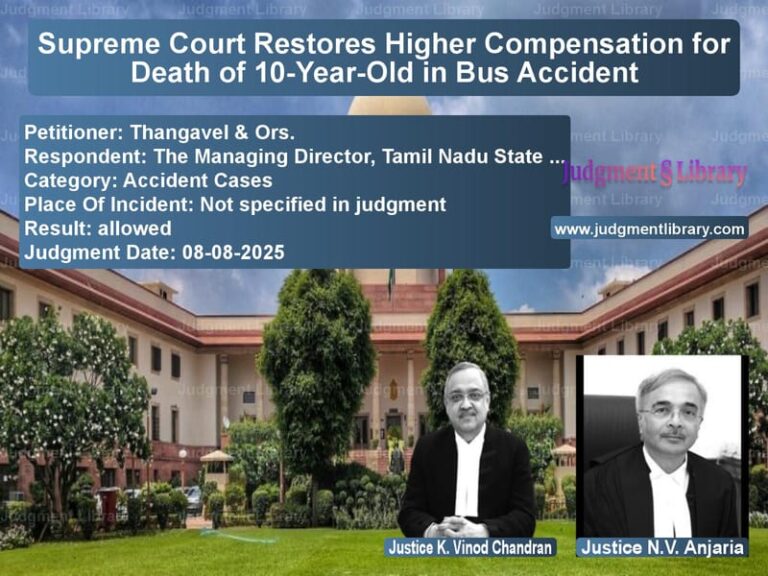Consumer Dispute: Supreme Court Sets Aside NCDRC Dismissal in Anjaneya Jewellery vs. New India Assurance
The case of M/s Anjaneya Jewellery vs. New India Assurance Co. Ltd. & Ors. revolves around a consumer dispute where the appellant challenged the dismissal of their complaint by the National Consumer Disputes Redressal Commission (NCDRC). The appeal was brought before the Supreme Court under Section 23 of the Consumer Protection Act, 1986. The Supreme Court’s ruling highlighted the importance of due process and ensuring fair hearing in consumer disputes.
Background of the Case
M/s Anjaneya Jewellery, the appellant, filed a consumer complaint before the NCDRC against New India Assurance Co. Ltd. regarding an insurance claim dispute. However, the NCDRC dismissed the complaint in limine (at the outset) without issuing a notice to the respondents or allowing the case to be heard on merits. Dissatisfied with this decision, the appellant challenged the order in the Supreme Court.
Legal Issue Before the Supreme Court
The primary legal question before the Supreme Court was whether the NCDRC was justified in dismissing the appellant’s complaint at the outset without issuing notice to the respondents and without allowing a full hearing on the matter.
Arguments by the Petitioner (M/s Anjaneya Jewellery)
- The appellant contended that the NCDRC erred in dismissing the complaint without considering its merits.
- The complaint raised substantial questions that required a response from the insurance company, and a summary dismissal was not justified.
- The principles of natural justice mandate that a consumer dispute should be decided only after giving both parties an opportunity to present their case.
- The appellant argued that the NCDRC’s dismissal denied them a fair hearing and relief under the Consumer Protection Act.
Arguments by the Respondents (New India Assurance Co. Ltd.)
- The insurance company contended that the NCDRC had the power to dismiss complaints at the admission stage.
- They pointed out that after the amendment of Section 13 of the Consumer Protection Act in 2003, the words “procedure on receipt of complaint” were replaced with “on admission of a complaint,” granting NCDRC discretionary powers to reject complaints outright.
- They argued that the NCDRC’s dismissal was within its jurisdiction and based on legal provisions.
Supreme Court’s Analysis and Judgment
The Supreme Court reviewed the impugned order of the NCDRC and the provisions of the Consumer Protection Act. It noted that while the NCDRC has jurisdiction to dismiss complaints at the admission stage, such a decision must be exercised judiciously and based on case-specific circumstances.
In its ruling, the Supreme Court held:
- “We are of the considered opinion that notice of the complaint should have been issued to the respondent for being tried on merits.”
- “The complaint filed by the appellant did not deserve its dismissal in limine, but rather should have been admitted for its disposal on merits after giving notice to the respondents.”
- The Court disagreed with the respondents’ argument that the NCDRC’s order was justified, stating: “Having regard to the nature of the dispute raised by the appellant in their complaint, the same prima facie needed a reply from the respondents and then its disposal on merits.”
Significance of the Judgment
The Supreme Court’s decision emphasized the importance of providing a fair hearing in consumer disputes. While acknowledging the NCDRC’s discretionary power to dismiss complaints, the Court clarified that such discretion must be used appropriately and in cases where dismissal is warranted based on clear grounds.
Remand of the Case
Considering the procedural lapse in the summary dismissal of the complaint, the Supreme Court set aside the NCDRC’s order and remanded the matter back for adjudication on merits. The Court directed:
- “We allow the appeal, set aside the impugned order, admit the appellant’s complaint under Section 13 of the Act, and grant one month’s time to the respondents to file their reply to the complaint.”
- “The NCDRC shall decide the complaint on its merits in accordance with law uninfluenced by any observations made in the impugned order as also in this order.”
Conclusion
The Supreme Court’s ruling reaffirmed the principles of natural justice in consumer protection cases. The decision ensures that consumer complaints are not dismissed summarily without giving both parties an opportunity to present their case. By remanding the matter to the NCDRC for proper adjudication, the Court upheld the rights of consumers to have their grievances heard in a fair and just manner.
The appeal was thus allowed, ensuring that the complaint would now be adjudicated on merits rather than being dismissed at the threshold.
Petitioner Name: M/s Anjaneya Jewellery.Respondent Name: New India Assurance Co. Ltd. & Ors..Judgment By: Justice Abhay Manohar Sapre, Justice Dinesh Maheshwari.Place Of Incident: New Delhi.Judgment Date: 07-03-2019.
Don’t miss out on the full details! Download the complete judgment in PDF format below and gain valuable insights instantly!
Download Judgment: Ms Anjaneya Jewelle vs New India Assurance Supreme Court of India Judgment Dated 07-03-2019.pdf
Direct Downlaod Judgment: Direct downlaod this Judgment
See all petitions in Commercial Insurance Disputes
See all petitions in Consumer Rights
See all petitions in Legal Malpractice
See all petitions in Judgment by Abhay Manohar Sapre
See all petitions in Judgment by Dinesh Maheshwari
See all petitions in allowed
See all petitions in Remanded
See all petitions in supreme court of India judgments March 2019
See all petitions in 2019 judgments
See all posts in Insurance Cases Category
See all allowed petitions in Insurance Cases Category
See all Dismissed petitions in Insurance Cases Category
See all partially allowed petitions in Insurance Cases Category







